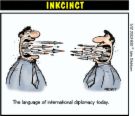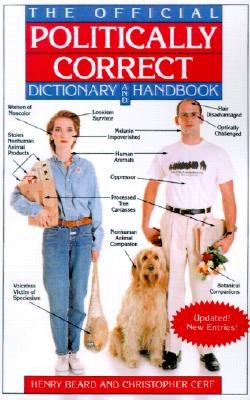a great battle between those who shape and create our language, and those who would like to...
The government versus the people.
Men against women.
Rich white males and minorities.
Us versus Them.
No one can escape it. And we call this struggle The Language War. There will be many casualties, people falling victim to political correctness left and right, attempts to create new words will fail miserably, and once-popular political phrases like, “It’s the economy, stupid” will fall into obscurity. Whoever wins this conflict will not only control our language, but society as well. In the process, our language may fall victim to the horrors of linguistic prescriptiveness and society will fall into chaos.~
Pretty dramatic, right? You could say I used my language to frame this issue a certain way, making the Language War seem like this imminent crisis. In fact, it is a struggle that has been going on since people first began using language to communicate. In Robin Lakoff’s book, The Language War, she uses many examples where language is used in power struggles. I began to thin k about how much power language really has in our society. From the evidence, it would seem that answer is, a lot.
k about how much power language really has in our society. From the evidence, it would seem that answer is, a lot.
I mean, look at all the tasks language performs in our lives; it can shape our reality, define us to other people, choose what issues we focus our attention on, frame topics so we look at them a certain way, give power to some groups, take it away from others, and, some language can even be world-changing, according to Lakoff. Even looking at the title of the book, Language War, indicates a battle between people for control of our language, and, subsequently control of society or public opinion. There are many instances throughout the four chapters we read where Lakoff describes situations where there are power struggles going on through language, and the lingusitic tools that people use to fight this war.
The section about political correctness intrigued me. I had heard about it; however, I always had trouble defining it (and I hate sketchy definitions, it threw me back to the bewilderment of the Ramage era). According to Lakoff’s description of political correctness, I was right; it is hard to define, and there have been many attempts to. In my mind political correctness is the way that Lakoff describes it: ways for groups that have not had the power over language to create some that helps define their groups, and their group’s concerns. These groups I am talking about could be any minority: women, African-Americans, Latin Americans, youth, etc, since traditionally it has been white males that have had the control over our language. Political correctness is one of their “weapons” in the Language War. It’s a way to keep those in check who would choose to use stereotypical or degrading language toward these groups.
power over language to create some that helps define their groups, and their group’s concerns. These groups I am talking about could be any minority: women, African-Americans, Latin Americans, youth, etc, since traditionally it has been white males that have had the control over our language. Political correctness is one of their “weapons” in the Language War. It’s a way to keep those in check who would choose to use stereotypical or degrading language toward these groups.
Sure, political correctness can be a pain in the butt. People have to think over what they say carefully to avoid being termed “Politically Incorrect” and never taken seriously again. But I think that it is important to some groups; since they can use it to defend against something that is protected by our Constitution: hate speech.
The 1st Amendment gives us freedom of speech; it’s a good thing and a bad thing. We can say anything we want (with a few exceptions), and, consequently,sometimes what we say hurts people. The debate over freedom of speech has pitted groups against each other: those who are for enforcing speech codes to fight hate speech and punish it, and those who stand by the 1st Amendment. The solution depends on what one values more: one of our guaranteed freedoms or protection from harmful or damaging language.
Pretty dramatic, right? You could say I used my language to frame this issue a certain way, making the Language War seem like this imminent crisis. In fact, it is a struggle that has been going on since people first began using language to communicate. In Robin Lakoff’s book, The Language War, she uses many examples where language is used in power struggles. I began to thin
 k about how much power language really has in our society. From the evidence, it would seem that answer is, a lot.
k about how much power language really has in our society. From the evidence, it would seem that answer is, a lot.I mean, look at all the tasks language performs in our lives; it can shape our reality, define us to other people, choose what issues we focus our attention on, frame topics so we look at them a certain way, give power to some groups, take it away from others, and, some language can even be world-changing, according to Lakoff. Even looking at the title of the book, Language War, indicates a battle between people for control of our language, and, subsequently control of society or public opinion. There are many instances throughout the four chapters we read where Lakoff describes situations where there are power struggles going on through language, and the lingusitic tools that people use to fight this war.
The section about political correctness intrigued me. I had heard about it; however, I always had trouble defining it (and I hate sketchy definitions, it threw me back to the bewilderment of the Ramage era). According to Lakoff’s description of political correctness, I was right; it is hard to define, and there have been many attempts to. In my mind political correctness is the way that Lakoff describes it: ways for groups that have not had the
 power over language to create some that helps define their groups, and their group’s concerns. These groups I am talking about could be any minority: women, African-Americans, Latin Americans, youth, etc, since traditionally it has been white males that have had the control over our language. Political correctness is one of their “weapons” in the Language War. It’s a way to keep those in check who would choose to use stereotypical or degrading language toward these groups.
power over language to create some that helps define their groups, and their group’s concerns. These groups I am talking about could be any minority: women, African-Americans, Latin Americans, youth, etc, since traditionally it has been white males that have had the control over our language. Political correctness is one of their “weapons” in the Language War. It’s a way to keep those in check who would choose to use stereotypical or degrading language toward these groups.Sure, political correctness can be a pain in the butt. People have to think over what they say carefully to avoid being termed “Politically Incorrect” and never taken seriously again. But I think that it is important to some groups; since they can use it to defend against something that is protected by our Constitution: hate speech.
The 1st Amendment gives us freedom of speech; it’s a good thing and a bad thing. We can say anything we want (with a few exceptions), and, consequently,sometimes what we say hurts people. The debate over freedom of speech has pitted groups against each other: those who are for enforcing speech codes to fight hate speech and punish it, and those who stand by the 1st Amendment. The solution depends on what one values more: one of our guaranteed freedoms or protection from harmful or damaging language.
My opinion?
I would like to say that I don’t mind giving up a little bit of free speech to end hate speech. I think it is a hurtful thing that creates irreparable barriers between people and groups. Once something is said, it cannot be taken back, ever. It has, as Lakoff said, changed the world. But then again, we have to think, if we would agree (which I don’t think will ever happen) to speech codes, who would decide what they would restrict? Probably those rich white males who already have most of the power. Would that really help much? Also, I think the main fear is, where would these restrictions stop? Would they end with one freedom?
“To be afraid of any idea is to be unfit for self-government.” — Alexander Meiklejohn, Testimony on the Meaning of the First Amendment
I think it is fear that prevents speech codes and why people dislike political correctness, fear of losing control over language. Fear of losing the Language War. Although, frankly, I don’t see anyone emerging victorious anytime soon.
No comments:
Post a Comment